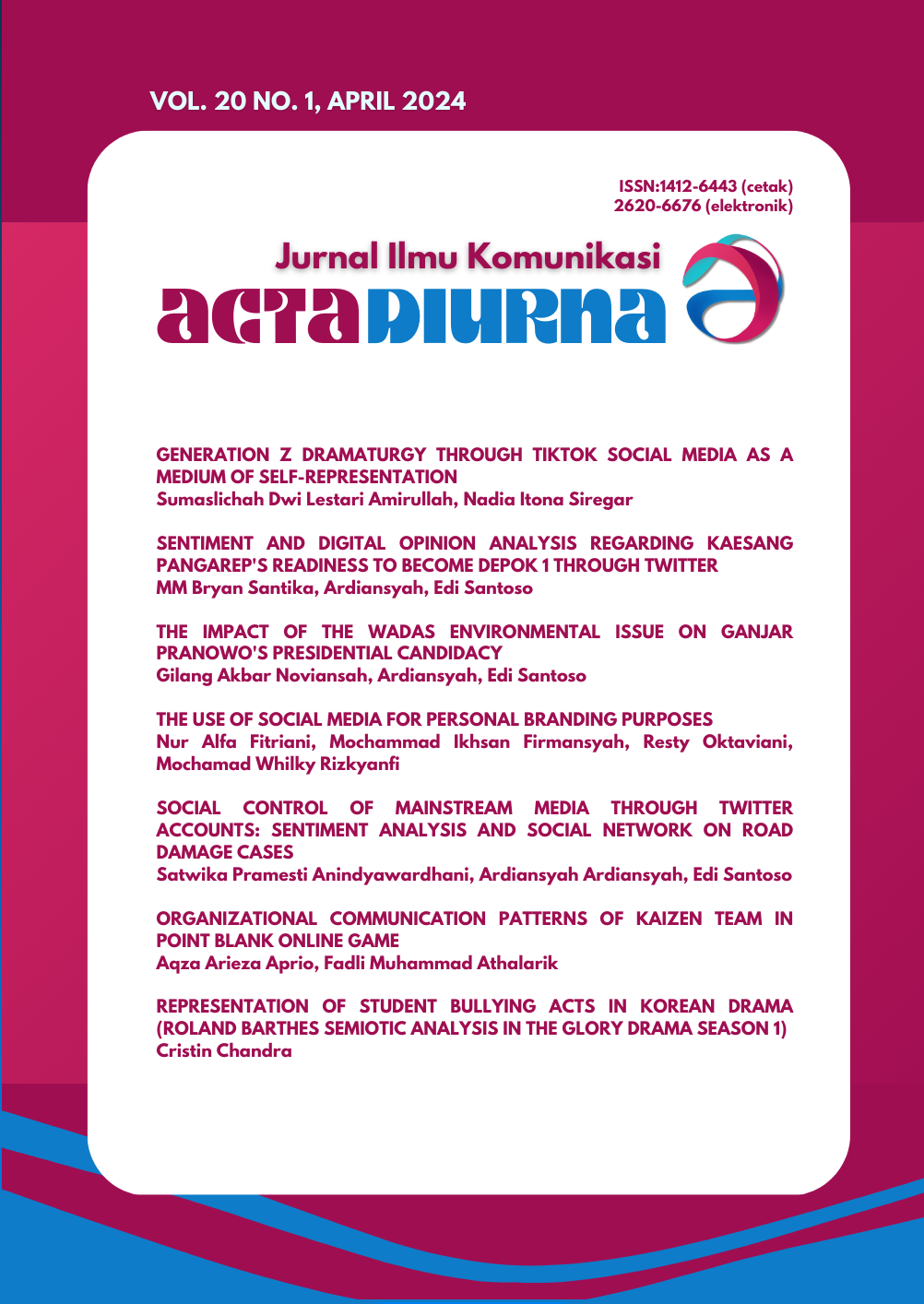ORGANIZATIONAL COMMUNICATION PATTERNS OF KAIZEN TEAM IN POINT BLANK ONLINE GAME
Abstract
The advancement of internet technology, one of its benefits is being used for entertainment, such as video games and online games. In some online games, there are various teams competing against each other to achieve specific goals. Not all online games have good in-game voice communication, and some lack this feature, like the online game Point Blank. The issue faced by Point Blank players is t he difficulty in finding suitable and practical means of interaction. This research aims to analyze the application of Discord in maintaining communication patterns within the Kaizen Team Organization in an Online First Person Shooter (FPS) game. The method used in this research is qualitative descriptive with observation, interviews, and documentation techniques. Based on the conducted research, Discord communication media utilized by the Kaizen Team Organization is considered effective during Point Blank gameplay. The communication process helps facilitate message delivery. The results of this research indicate that the suitable and effective communication for the Kaizen Team involves the communication patterns of All-Channel, Wheel, and Y. Furthermore, two different types of organizational communication implementation were found within the Kaizen team, namely informal communication and formal communication.
References
Almutazam, F. (2022) ‘Pola Komunikasi Gamers dalam Game Online Mobile Legends pada Mahasiswa Fakultas Ushuluddin Adab dan Dakwah’, Jurnal Kinoma : Jurnal Komunikasi dan Penyiaran, 1(2), pp. 101–112.
Arikunto, S. (2013) Pengembangan Instrumen Penelitian dan Penilaian Program. Yogyakarta: Pustaka Pelajar.
Arisandi, R. A. (2017) ‘Pola Komunikasi Kelompok Game Online FPS (First Person Shooter) Point Blank’, Universitas Muhammadiyah Malang. Available at: http://eprints.umm.ac.id/id/eprint/35427.
Atur, I. (2019) ‘Pola Komunikasi E-Sport dalam Pembinaan Atlet’, Jurnal Ikon, XXIII(1), pp. 53–61.
Cap (2022) How We’re Building The Future Of Discord, Discord. Available at: https://discord.com/blog/building-the-future-of-discord (Accessed: 17 February 2023).
Darmawan, A. P. (2022) apa Saja Pola Komunikasi Organisasi?, KOMPAS.com.
Dr. Irene Silviani (2020) komunikasi Organisasi. Edited by Dr. Irene Silviani. Surabaya: PT. Scorpindo Media Pustaka.
Eraspace (2022) 5 Aplikasi Voice Chat untuk Bikin Aktivitas Gaming Seru, eraspace. Available at: https://eraspace.com/artikel/post/5-aplikasi-voice-chat-untuk-bikin-aktivitas-gaming-seru (Accessed: 10 April 2023).
Haryani, S. (2001) komunikasi Bisnis. Edited by H. Subanar. Yogyakarta: UPP AMP YKPN.
Haryono, C. G. (2020) Ragam Metode Penelitian Kualitatif Komunikasi. Jawa Barat: CV Jejak (Jejak Publisher).
Lukito, A. R. et al. (2022) ‘pola Komunikasi Komunitas Game Online FORZA HORIZON 4 (Studi Etnografi Virtual Mengenai Pola Komunikasi Dalam Grup Discord)’, JURNAL HERITAGE, 10(1), pp. 17–26.
Moleong, L. (2018) Metodologi Penelitian Kualitatif. Bandung: PT. Remaja Rosdakarya.
Muhammad, A. (2014) Komunikasi Organisasi. Pustaka Bani Quraisy & Fiskontak.
Mukhtar (2013) Metode Praktis Penelitian Deskriptif Kualitatif. Jakarta: Referensi (GP Press Group).
Murniarti, E. (2019) Organisasi Formal, Aliran Komunikasi Formal dalam Organisasi, Organisasi Informal, dan Peran Komunikasi Informal. Jakarta: Universitas Kristen Indonesia.
Pratama, J. (2021) ‘Pola Komunikasi Antara Pelatih dan Atlet U-13 Always Futsal Klub Sebelum dan Saat Pertandingan’, Jurnal Komunikasi, Masyarakat dan Keamanan (KOMASKAM), Vol. 3(2656–6125), pp. 65–80.
Raharja, D. M. (2022) ‘KOMUNIKASI PENJUAL KEPADA PEMBELI ( Studi Kasus Komunikasi Penjual Kepada Pembeli Di Pasar Ujungberung , Kota Bandung )’, Jurnal Komunikasi, Masyarakat dan Keamanan (KOMASKAM), Vol. 4(2656–6125), pp. 1–9.
Raihan, J. P. and Putri, Y. R. (2018) ‘Pola Komunikasi Group Discord PUBGI.INDO.FUN melalui Aplikasi Discord’, e-Proceeding of Management, 5(3), pp. 4161–4169.
Rizaty, M. A. (2023) pengguna Internet di Indonesia Sentuh 212 Juta pada 2023, Dataindonesia.id.
Robbins, S. P. (2022) Organizational Behavior. 18th edn. Harlow: Pearson Education.
Sugiyono (2020) Metodologi Penelitian Kualitatif. In Metodologi Penelitian Kualitatif, Rake Sarasin. Bandung: PT. Remaja Rosdakarya. Available at: https://scholar.google.com/citations?user=O-B3eJYAAAAJ&hl=en.
Trianto, Y. (2018) ‘Pola Komunikasi Virtual dalam Percakapan Tim Game Online Counter Strike’, Jurnal Spektrum Komunikasi, 6(1), pp. 12–18.
Usman Basir, R. and Naryoso, A. (2022) ‘Komunikasi untuk Pemeliharaan Hubungan Pertemanan antara “Gamers Online”’, Interaksi Online, 10(2), pp. 14–26. Available at: https://www.fisip.undip.ac.id.
Winarni, E. W. (2018) Teori dan Praktik Penelitian Kualitatif : Penelitian TindaKan Kelas (PTK) Research and Development (R&D). 1st edn. Jakarta: Bumi Aksara.
Yulannugroho, C. H. (2023) ‘Kepuasan Remaja Menggunakan Aplikasi Discord (Studi Deskriptif Kuantitatif Kepuasan Remaja Menggunakan Aplikasi Discord di Surabaya)’, Commercium, 06(02), pp. 20–28.
Zellatifanny, C. M. and Mudjiyanto, B. (2018) ‘Tipe Penelitian Deskripsi dalam Ilmu Komunikasi’, Jurnal Diakom, 1(2), pp. 83–90.
Zepetto (2015) Sejarah Point Blank, Zepetto Interactive Indonesia. Available at: https://www.pointblank.id/news/list (Accessed: 15 April 2023).

This work is licensed under a Creative Commons Attribution-ShareAlike 4.0 International License.
Authors who publish with this journal agree to the following terms:
- Authors retain copyright and grant the journal right of first publication with the work simultaneously licensed under a Creative Commons Attribution License that allows others to share the work with an acknowledgment of the work's authorship and initial publication in this journal.
- Authors are able to enter into separate, additional contractual arrangements for the non-exclusive distribution of the journal's published version of the work (e.g., post it to an institutional repository or publish it in a book), with an acknowledgment of its initial publication in this journal.
- Authors are permitted and encouraged to post their work online (e.g., in institutional repositories or on their website) prior to and during the submission process, as it can lead to productive exchanges, as well as earlier and greater citation of published work (See The Effect of Open Access).














